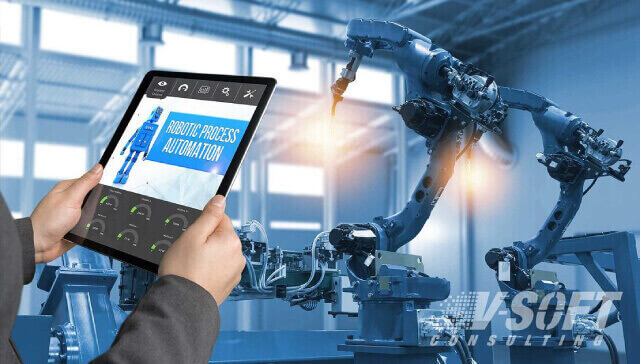Table of Contents
As you all know, the digital technology era has brought us many inventions of great significance in solving life’s needs. In particular, these technologies have allowed businesses to improve both the output and quality of products and services in the manufacturing sector.
One of the technologies that have realized the process automation dream of many businesses is Robotic Process Automation. In the following article, Winactor Support will introduce you to the benefits of RPA in the IT Industry.
What Is RPA?
RPA is a software robot that automates the process. An RPA system will include a combination of many bots, each type of bot will have different tasks and functions to automate repetitive tasks with fixed logic.
Although developed based on AI technology and ML machine learning, RPA is not capable of self-learning and creativity.
Therefore, it will not change the process by itself during operation. The software robot can only remember, copy, and repeat the actions that humans have set for it. Therefore, mistakes are unlikely to happen with robotic process automation.
Pros and cons of RPA
Advantages of RPA
- Improve efficiency: By using robotic process automation in your processes, businesses will have the opportunity to improve labor productivity significantly. Because RPA can continuously work for a long time without resting. At the same time, it can handle a large volume of work in a short time with high working efficiency, bringing the desired ROI for the business.
- Accelerate accuracy: In some jobs, such as processing records, contracts, accuracy is a must when employees perform this job. Therefore, it usually takes an employee a long time to review the information, prone to errors. By using RPA, businesses will minimize the possibility of errors. At the same time, it will shorten the processing time to ⅓ compared to humans.
- Legacy: The system of RPA bots can easily integrate into the legacy system. It can work effectively on the old system of the enterprise without any operational errors. In addition, the fact that Robotic Process Automation works well with data logging also helps businesses assess the company’s current status.
- Friendly interface: The software robot has an excellent interface; users can easily set up the bots to work without too much programming knowledge. At the same time, RPA will work directly on your computer. You will not need to use any other intermediate devices.
<>Disadvantages of RPA
- Requires highly skilled human resources: With some jobs that do not require creativity, RPA can completely replace people. This will result in businesses needing highly qualified employees to do more value-added work. Employees who regularly perform desk jobs will need to change positions to jobs where RPA cannot do.
- Opposition: Have to change jobs is something that many employees will feel uncomfortable with the presence of RPA. It would be best to remember that robots were born to do jobs that humans have not worked efficiently and waste time. Humans are more creative than robots, so why not use that advantage to do more meaningful and creative work. Be honest with yourself that you will need to create more value than you do now.

<>What Are RPA’s Capabilities in the IT Industry?
As you know, the information technology department is responsible for implementing the company’s software solutions:
- In-house software development
- Identify new employees recruited into the system
- Profile settings
- Grant permission
- Create email
Since most of this work is repetitive, it makes perfect sense to apply RPA. It will allow businesses to automate these tasks efficiently.
With some network technologies like firewalls or load balancing, continuous measurement is imperative to ensure that your company gets the most out of them. Then, using software robots will help businesses manage strong performance and run updates better.
At the same time, employees will perform tasks on the enterprise’s network more safely and quickly, thanks to RPA bots.
In addition, in the IT field, RPA also has another outstanding advantage: manual user checking. The RPA bots will mimic human actions so that manual tests can be easily performed on the software. From there, employees will be relieved of the burden of manually checking software operations.
<>What Awaits the IT Industry in the Future with RPA?
Currently, many new businesses have appeared in the IT industry with the appearance of the system of RPA bots. And new opportunities for service provider are created for RPA system analysis, development, and process planning and integration. So how to have a service provider with RPA?
To answer this question, you will need to prepare all the necessary RPA adoption and development tools. You can meet RPA’s system with free or paid certificate programs online to start your service provider.
At the same time, you will need to learn how to develop an RPA system from beginner to advanced level to fully understand all aspects of RPA, when knowledge combined with certification will allow you to be at the forefront of job opportunities in this field.
<>How Productive Has RPA Been In The IT Industry?
The application of Robotic Process Automation has created a big revolution for the future of IT industry.
When every business wants to optimize parameters to increase the success rate with higher productivity, it makes perfect sense to apply RPA, which helps to perform repetitive tasks with fixed logic. IT staff will have more time to focus on creating more new values, bringing economic efficiency to the business.
<>Conclusion
Hopefully, the article will help you better understand the advantages and disadvantages of RPA and its application in the IT field. In the future, when information technology is more and more developed, the application of RPA will help businesses have the opportunity to create more new products, contributing to increasing economic efficiency for them.
In addition to IT, RPA has been doing its job well in many different fields: insurance, healthcare, business, etc… Therefore, it deserves to become the most powerful enterprise software globally.
Now, all RPA tools can be flexibly applied to many different processes.

WinActor is an RPA software solution by NTT DATA Corporation to help businesses master technology, create breakthroughs in the digital age 4.0.




